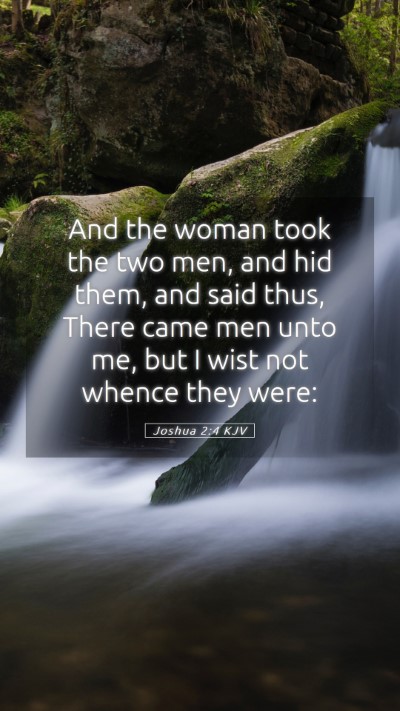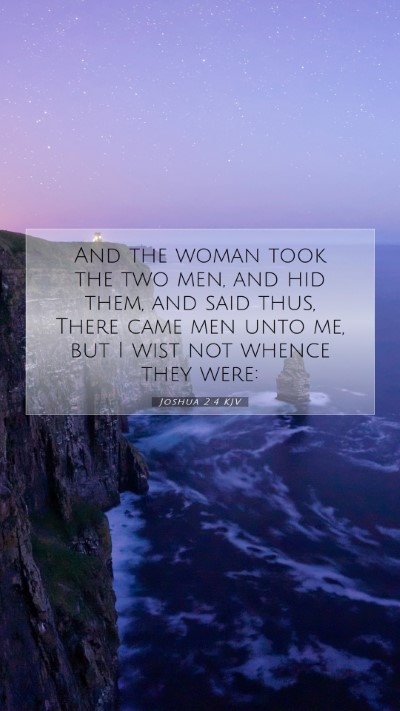Old Testament
Genesis Exodus Leviticus Numbers Deuteronomy Joshua Judges Ruth 1 Samuel 2 Samuel 1 Kings 2 Kings 1 Chronicles 2 Chronicles Ezra Nehemiah Esther Job Psalms Proverbs Ecclesiastes Song of Solomon Isaiah Jeremiah Lamentations Ezekiel Daniel Hosea Joel Amos Obadiah Jonah Micah Nahum Habakkuk Zephaniah Haggai Zechariah MalachiJoshua 2:4 Meaning
What is the meaning of Joshua 2:4?
And the woman took the two men, and hid them, and said thus, There came men unto me, but I wist not whence they were:
Joshua 2:4 Bible Verse Meaning
Understanding Joshua 2:4
Joshua 2:4 states, "But the woman had taken the two men, and hidden them; and said thus, There came men unto me, but I wist not whence they were." This crucial moment in the narrative holds profound significance in both historical context and theological implications.
Context and Background
The events in Joshua 2 occur during a pivotal time as the Israelites prepare to enter the Promised Land. The spies sent to Jericho represent a strategic move in God's unfolding plan for His people. This verse highlights Rahab's brave decision to protect the Israelite spies, showcasing themes of faith, courage, and the complexities of moral choices.
Verse Meaning and Commentary
The commentary insights from revered theologians such as Matthew Henry, Albert Barnes, and Adam Clarke offer a rich tapestry of understanding regarding this verse.
- Matthew Henry's Commentary: Henry emphasizes Rahab's faith and her quick thinking. He notes that despite being a Canaanite, she recognized the power of Israel's God. Her actions demonstrate that fear and reverence for God can lead individuals to act righteously.
- Albert Barnes' Commentary: Barnes reflects on the moral implications of Rahab's deception. He discusses how God rewards her faith despite her lies, suggesting that God looks at the heart's intentions rather than mere human actions. This highlights the complexity of moral decisions in the face of dire circumstances.
- Adam Clarke's Commentary: Clarke acknowledges that Rahab's actions were a significant act of faith, illustrating her understanding of the impending judgment upon Jericho. He underscores the contrasts between her belief and the doubts of Israel's spies, emphasizing the idea that faith can be found in unexpected places.
Theological Implications
The act of hiding the spies raises important theological questions regarding the nature of truth and deception. The narratives surrounding Rahab present a unique analysis of her actions in light of biblical ethics. The insights drawn from various commentaries suggest that God's overarching plan sometimes involves unconventional methods and choices, leading to a greater purpose.
Application of the Verse
For readers today, Joshua 2:4 and its commentary can be applied in several ways:
- Faith in Adversity: Rahab’s story encourages believers to act in faith even when faced with difficult choices.
- Understanding Context: The historical background enriches our understanding of faith and morality, urging modern readers to discern right from wrong amidst challenging circumstances.
- God’s Grace: This verse showcases God's grace and mercy, highlighting that redemption is available to all who believe, regardless of their past.
Additional Cross References
- Hebrews 11:31: Rahab is commended for her faith.
- James 2:25: Discusses Rahab’s actions as an example of faith and works.
- Matthew 1:5: Mentions Rahab in the genealogy of Jesus, illustrating her inclusion in God's redemptive plan.
Conclusion
Joshua 2:4 serves as a powerful reminder of how faith can manifest in unexpected ways through acts of courage and conviction. The insights from public domain commentaries deepen the understanding of this scripture, providing a rich resource for bible study insights and bible verse explanations. For those searching for understanding Scripture or engaging in bible study groups, this verse exemplifies the essence of living faith amidst uncertainty.


